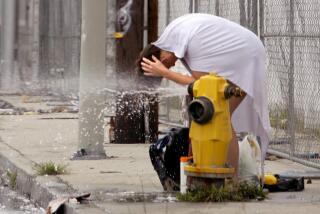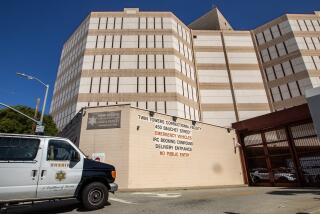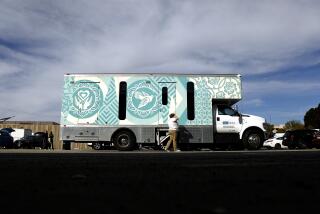Death toll in San Diego’s hepatitis A outbreak rises to 19
- Share via
The death total in San Diego’s ongoing hepatitis A outbreak reach 19 Tuesday, one more than last week, according to a newly-released health department update.
Case counts also increased from 490 to 507, according to the county Health and Human Services Agency. The increases are the latest mileposts in a public health emergency that has grown among the region’s homeless and drug-using residents every week since it was first detected in early March.
While the increases have been relentless, there are reasons, said Dr. Wilma Wooten, the county’s public health officer, to think that the outbreak’s growth may be slowing.
Last week, she said, 10 new cases were reported to the county and, while that’s surely more than anyone would hope, it’s significantly less than the number of new cases coming in every week just a few months ago.
“The numbers are slowing down. It’s not the 20 cases a week that it has been in June, July and August,” Wooten said on Tuesday.
But the physician was reluctant to say that she’s seeing a new trend. Outbreaks are unpredictable and, because the virus causing so many infections and has a very long incubation period, it is still possible to see the number of cases surge.
“We have to be cautious. We know that this virus has an incubation period of 15 to 50 days, and we know that there are cases out there that just haven’t started to show symptoms yet,” Wooten said.
Vaccination has always been the lynchpin of the county’s outbreak-fighting strategy. As of last week the county reported that 68,500 hepatitis A vaccinations have been administered since March.
Nearly 100 hand-washing stations and more portable toilets have been installed around the region, while regular sidewalk cleaning is taking place in certain areas.
On Friday, the California Department of Public Health declared a statewide public health emergency, a move that allows the state to purchase additional vaccine doses directly from manufacturers after the state hit the limits of a special free vaccine program run by the U.S. Centers for Disease Control and Prevention.
While declining to say exactly how many doses the county has on hand, Wooten said she believes that there is enough supply to keep giving shots to those who are at highest risk of infection, including homeless residents, drug users, those with existing liver disease, gay men and those with compromised immune systems.
Anyone outside specified at-risk groups, she added, are now being actively advised to wait due to the constraints on vaccine supply mentioned last week by the state.
“We are asking health providers to not vaccinate those individuals right now that might want to be immune to wait until the beginning of the year when more vaccine is available,” Wooten said.
With large vaccination efforts underway to control outbreaks in several states, it has been unclear how much the nation’s supply of hepatitis A vaccine has been depleted. The CDC, which has indicated that it is in direct communication with the two manufacturers who make the vaccine in the U.S., has provided no solid answers.
“While CDC communicates with vaccine manufacturers to help manage vaccine supply constraints and disruptions, this information is proprietary and used solely for planning and public health response purposes,” Ian Branam, press officer for the CDC’s National Center for Immunization and Respiratory Diseases, said in an email Tuesday.
A shrinking vaccine supply has created a bit of an awkward situation for many in the prevention community. Scott Suckow, executive director of the American Liver Foundation’s Pacific Coast Division, said late last week that the standard message has been for everyone to get a hepatitis A vaccination just in case they are exposed. Recent months, though, have called for a shift in strategy toward those whose liver disease makes them at a higher risk of death than the overall population.
“We don’t want to overburden a public system when the public system is really focusing on those most at risk,” Suckow said.
The county health department has recently doubled down on its efforts to reach those at risk, with than 500 foot team missions in areas where homeless people gather, in addition to focusing on vaccination clinics at shelters and other nonprofits serving them homeless.
Wooten said a growing crew of volunteer nurses from the region’s many health systems in addition to paramedics, who were recently granted temporary vaccination powers by the state, are getting ready to start vaccinating residents in single-room-occupancy hotels and substance abuse treatment facilities.
Wooten said she does not expect these volunteer teams to begin their work until November because four hours of training is required before they can head out to pre-arranged locations.
While nurses and paramedics already know how to give shots, Wooten said they need to know follow specific public health requirements, including keeping the vaccine cold, while vaccinating residents.
Asked how many people the county estimates it must vaccinate to reach a level of community immunity strong enough to end the outbreak, Wooten did not share a specific number. She did say that there are estimated to be about 125,000 intravenous drug and methamphetamine users who are at risk along with somewhere between 9,000 and 25,000 people who are either homeless or who have insecure living conditions.
Getting about 80 percent of the people in high-risk categories immunized, she said, should create the kind of “herd immunity” that can stop an outbreak from spreading.
Hepatitis A is spread when a person swallows even a tiny amount of feces from an infected person. Proper hand washing with warm soapy water for at least 20 seconds after using the bathroom kills the virus.
Health Playlist


Video: Leaders urge public to help extinguish hepatitis outbreak
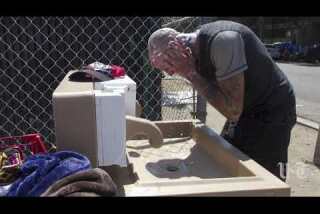
San Diego starts cleansing sidewalks, streets to combat hepatitis A

Video: Scripps to shutter its hospice service
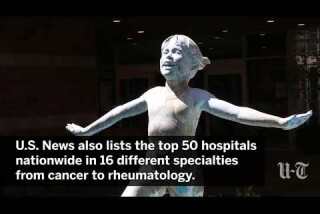
Video: Scripps La Jolla hospitals nab top local spot in annual hospital rankings

Video: Does a parent's Alzheimer's doom their children?
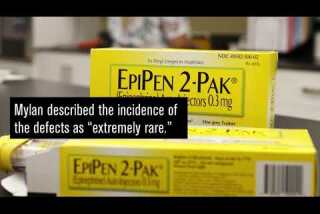
EpiPen recall expands

Kids can add years to your life
paul.sisson@sduniontribune.com
(619) 293-1850
Twitter: @paulsisson
Correction: A previous version of this story mistated the incubation period of the hepatitis A virus.
More to Read
Sign up for Essential California
The most important California stories and recommendations in your inbox every morning.
You may occasionally receive promotional content from the Los Angeles Times.
